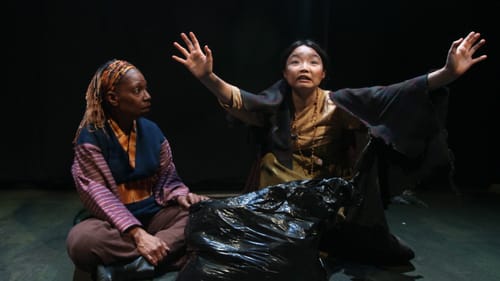Stay in the Loop
BSR publishes on a weekly schedule, with an email newsletter every Wednesday and Thursday morning. There’s no paywall, and subscribing is always free.
Proclaim their names
Theatre Exile presents Hansol Jung’s ‘Among the Dead’

Hansol Jung’s dark comedy Among the Dead brings sharp focus to the lives of the often-forgotten Korean “comfort women” and the complicated history of their divided nation in an earnest yet shaky production at Theatre Exile.
My high-school history classes dedicated a substantial amount of time to America’s participation in World War II, but gave little attention to Japanese-occupied South Korea and Burma/Myanmar and even less to the Korean "comfort women." The Japanese Imperial Army forced these young women into sexual slavery, their bodies used and discarded by the soldiers at nauseatingly high rates. Among the Dead indicates that they were even stripped of their names and reduced to numbers for identification.
Timelines and tall orders
The play begins with a brief prelude in 1945 Myanmar with an American soldier, a comfort woman known as “Number Four” (Claris Park), and the child she is insisting that he take to America before coming back for her. We then jump to 1975 to meet Ana Woods, Number Four’s daughter (Bi Jean Ngo). At the behest of her late father, Luke Woods (a strong James Kern), Ana finds herself in a hotel room in Seoul, South Korea, with a box of full of his ashes. She is agitated over being in Korea in the first place—she makes short work of the minifridge’s tiny whiskey bottles and happily accepts a stranger’s joint to mellow out. But what seems like a clichéd “woman learning her family’s dark past” narrative gets knocked in an exhilarating direction when a meddling Jesus (yes, that Jesus) shows up with Luke’s wartime diary, time bends, and her father’s younger self appears with a loaded gun in his own reality during World War II.
When the timelines crash into one another, in a fascinating and mind-twisting plot device, Ana becomes Number Four, reliving the fraught and short-lived time that her mother and father spent running from the Japanese Army in search of safety with the Americans. It’s a tall order to hold that duality, and Ngo finds a better fit as Number Four, where her vulnerability is more accessible. But her Ana is successful, and she’s delightful in moments when the character is searching to regain control—particularly when tensely singing “Let It Be.”
Light, dark, and hope
Things splinter further when the play weaves in Number Four’s postwar existence, and we see her four years after the end of the war as she waits for Luke to come back and meet her on the Hangang Bridge. Park gives a powerful performance as Number Four, with a no-nonsense zeal and a haunting openness.

You might be wondering how this material translates into any semblance of comedy. But Jung’s wry yet loving treatment allows for both the light and the dark to coexist, with an injection of just enough hope to spark something other than devastation by the play’s end. She does not spare us the harsh realities, but she does find a formula that gives release through laughter. And Cathy Simpson’s charming and grounded Jesus is never far away to serve up a well-timed joke. Somehow, it all works.
The forgotten ones
The play is not an easy one, and director Deborah Block’s staging occasionally confuses a premise that is already difficult to track—the stage pictures she creates, while visually engaging, make the eye jump frantically in attempts to follow all of the characters on stage. This is exacerbated by the decision to have the audience on two sides and the action taking place in the middle; one section of spectators inevitably misses out when the other side gets favored in the action.
Colin McIlvaine’s set splits the stage between a 70s-style hotel room, with wood paneling and retro quilted bedding, and a bare expanse to represent the Korean forests. Ashy-white branches hang all around, adding wildness and an eerie atmosphere. They are complimented nicely by Drew Billiau’s lighting, though the occasional neon green or blue casts a harshness that jars and draws too much awareness to their presence in the design.
In a moment of frenzy and fear, Luke begins to recite Psalm 6 from the Bible, which includes the following line: “Among the dead, no one proclaims your name. Who praises you from the grave?” At the heart of Among the Dead is a plea to remember the women, the refugees, the survivors, those we have forgotten who deserve to be recognized. Who will proclaim their names?
What, When, Where
Among the Dead. By Hansol Jung, directed by Deborah Block. Through May 26, 2019, at Theatre Exile, 1340 S. 13th Street, Philadelphia. (215) 218-4022 or theatreexile.org.
Theatre Exile is a wheelchair-accessible venue with gender-neutral restrooms.
Sign up for our newsletter
All of the week's new articles, all in one place. Sign up for the free weekly BSR newsletters, and don't miss a conversation.

 Alix Rosenfeld
Alix Rosenfeld